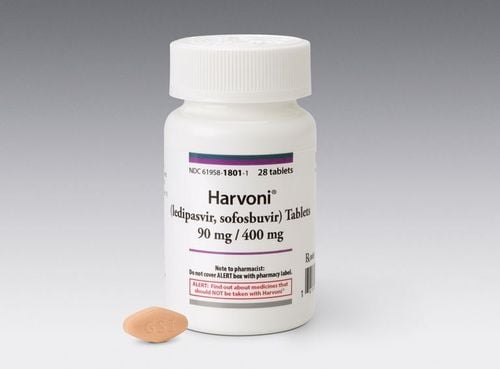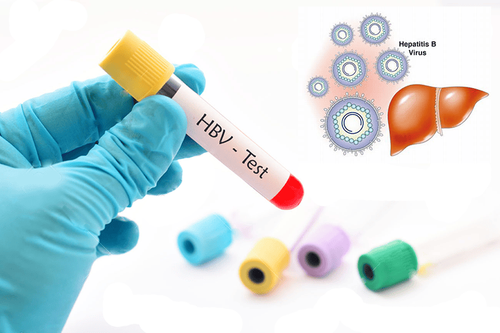This is an automatically translated article.
The article is professionally consulted by Master, Doctor Tran Thi Vuong - Laboratory Department - Vinmec Hai Phong International General Hospital.
According to statistics, patients with hepatitis B who have the HBV virus will have a 100 times higher risk of developing hepatocellular carcinoma and is the leading cause of liver cancer today. Therefore, for patients diagnosed with hepatitis B, in order to be able to monitor and treat fully, doctors will appoint tests to monitor liver damage in the patient.
1. What is hepatitis B?
The liver has a very important role in the overall cycle of human health, when the liver is swollen or damaged, it may not function as it should and this can directly affect health. patient's health.Hepatitis B is a disease that represents an infection of the liver caused by the hepatitis B virus, which causes liver swelling and serious liver damage. In many countries, hepatitis B is transmitted from mother to child at a very high rate. It is also the leading cause of liver cancer.
Alcohol, beer, stimulants and drugs, viruses are factors that can cause hepatitis. Currently, people are very susceptible to hepatitis B or hepatitis A, hepatitis C, although the names and types of viruses are different, they all have one thing in common: they cause damage. certain for the liver of the patient.
Hepatitis B progresses to liver cancer quickly if the patient is not detected early and has a timely treatment plan.
2. How does hepatitis B affect health?
Hepatitis B is divided into two types, acute and chronic. In adults, most patients who are infected with the hepatitis B virus clear up the virus within 6 months and become immune to the virus, unable to get hepatitis B again. you can spread it to others - this is called acute hepatitis B. However, when the virus lasts for more than 6 months, it also means that the patient has chronic hepatitis B. According to one study, up to 90% of children infected with hepatitis B will develop a chronic infection that causes liver damage, liver failure and sometimes liver cancer in adulthood.The younger the age of hepatitis B infection, the higher the risk of liver damage and progression to liver cancer in adulthood. In case of chronic hepatitis B, the patient needs to go to the hospital for a health checkup at least once a year to determine the extent of liver damage. Your doctor will give you the best advice on how to take care to manage your condition and be able to live a healthy life without ever needing to take medicine for advanced hepatitis B.
However, there are also many cases of people suffering from severe liver damage, poor health, fatigue and hepatitis B progressing to cirrhosis, liver cancer... due to lack of follow-up. disease regularly for timely intervention.

3. Tests to monitor damage caused by hepatitis B
In fact, most people with chronic hepatitis B have no symptoms, even though they may have cirrhosis from hepatitis B or early-stage liver cancer. Therefore, when monitoring liver damage in people with hepatitis B, it is necessary to check for signs of hepatitis, the extent of damage as well as assess the status of virus activity or development. Some of the tests that need to be done to monitor liver damage from hepatitis B include:3.1 Liver enzyme test (ALT) This test should be done every 6 months, it is one of the most common tests. The test is necessary and does not cost much, so the patient can rest assured to do it.
The goal of liver enzyme testing is to assess whether a patient's condition requires medication. If the ALT level is high, it means that the liver has been damaged and requires medication to control this condition. If the ALT level is normal, the patient may not need to have other tests, unless there are signs of cirrhosis caused by hepatitis B or are using chemotherapy to treat cancer.
3.2 Viral viral load test by PCR (HBV DNA test) This is a test that helps to measure the viral load in the blood of people with hepatitis B. People should have a PCR test as soon as diagnosis and treatment begin. treatment of hepatitis B. In case the patient has a high ALT level, this test will help confirm whether the liver damage is caused by the hepatitis B virus or not. However, if the viral load decreases or falls below the detection threshold, the patient's body has responded well to treatment.
According to the doctor's advice, hepatitis B patients should have a PRC viral load test every 6 -12 months to help assess the effectiveness of treatment and detect drug resistance early (if any).
3.3 Testing for HBeAg and anti-HBe HBeAg testing will be needed after a person has been diagnosed with chronic hepatitis B. HBeAg is a marker that can help evaluate the level of viral activity and indirectly reflect the results of viral load in the patient's blood.
In case the test results are positive for HBeAg, the patient should be retested every year to be able to monitor the activity of the virus. If there is HBeAg positive to negative conversion and anti-HBe is present, it means that the body has responded well to treatment, but this case only occurs in patients who have been treated for many years.
Although anti-HBe appears, it does not mean that the patient has completely recovered from hepatitis B and does not need to continue treatment, because many patients carry the hepatitis B virus with progressive mutations. does not produce HBeAg. Therefore, it is necessary to conduct a viral load test to give more accurate results.
3.4 Platelet and Albumin Count Test When performing platelet count and albumin testing to monitor liver damage in patients with hepatitis B, if the platelet count is less than 150,000 cells/mm3 and combined with also low albumin level <=3.5 gm/dl and reduced or absent clotting time indicates the patient has signs of impaired liver function or cirrhosis due to hepatitis B .
3.5 Liver Biopsy Test Because hepatitis B can be the leading cause of liver cancer, liver biopsy is indicated in patients with mildly elevated liver enzymes or no association. This is an invasive procedure so it is not widely indicated. Do not perform liver biopsy if there is sufficient evidence to warrant treatment of the disease based on other criteria.
3.6 AFP test

3.7 Ultrasound and ultrasound of liver tissue elasticity in patients with hepatitis B Liver ultrasound in patients with hepatitis B will help make the imaging more accurate when detecting tumors in the liver. Tissue elastography allows to assess the stiffness of the liver tissue and evaluate the quality of the damaged tissue if present. If only ultrasound, the ability to detect liver cancer is about 80%, but if combined with AFP test, the results will be more accurate.
Patients with advanced hepatitis B need to conduct AFP test and liver ultrasound every 6 months to screen for liver cancer more accurately.
Liver cancer screening is very important because most patients with liver cancer will have no symptoms and feel completely healthy until the disease is at an advanced stage. Small tumors in the liver cannot be felt or felt because the liver is located deep behind the ribs and liver cancer progresses very quickly. Liver cancer caused by chronic hepatitis B usually occurs in the age group 30 - 65. Therefore, patients should begin routine liver cancer screening at age 30 in men and 50 years old in women.
Hepatitis B can progress to cirrhosis, very dangerous liver cancer. Therefore, everyone should actively learn about this disease to have effective and safe prevention measures.
Master. Doctor. After graduating as a general practitioner, Tran Thi Vuong spent 2 years training in microbiology in Japan. With 9 years of teaching experience at Hai Phong University of Medicine and Pharmacy, participating in many domestic and foreign scientific research projects, continuous training in Laboratory Biosafety and Laboratory Quality Assurance at the National Hospital for Tropical Diseases, has experience in diagnostic testing for bacterial and viral infections. Currently, he is a doctor at the Laboratory Department of Vinmec Hai Phong International General Hospital.
Please dial HOTLINE for more information or register for an appointment HERE. Download MyVinmec app to make appointments faster and to manage your bookings easily.














